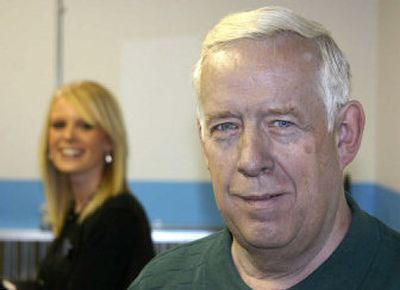Perennial loser changes color of American politics

BOZEMAN – Stan Jones, a Montana libertarian widely known for his peculiar blue skin, can arguably be said to have recast the political complexion of the U.S. Senate, turning it from Republican red to the same color as his face.
That face, it should be noted, is not the dark blue of TV graphics that show where the Democratic Party increasingly holds sway. Nor is it the pale blue of the big Montana sky as autumn turns to winter. It is an ashen blue-gray, more suited to the undertaker’s slab than the politician’s stump.
In any case, this is what the 67-year-old candidate accomplished last Tuesday: He won 10,324 votes in the make-or-break Senate race in Montana, a contest that Democrat Jon Tester won by 2,565 votes over three-term Republican incumbent Conrad Burns.
Jones is a quirkily conservative kind of libertarian – opposed to abortion and same-sex marriage. So it can be argued that he took the bulk of his votes from the conservative Burns, which tipped the election to Tester, which tipped the Senate to the Democrats, which tipped the scales of U.S. political history.
“I’m tickled about that,” said Jones. “There is excitement for you to be talking to the guy who changed the country.”
In the past, elections have given Jones little to be tickled about.
He is a perennial loser in Montana politics, a fringe candidate who sometimes must sue to get invited to television debates. He also is a man who accidentally turned his skin blue by drinking a homemade antibiotic laced with silver.
He first took the medicine in 1999, he said, fearing that the year 2000 would wreck computers, spread terrorism and disease, and make prescribed antibiotics unavailable. He concedes now that he miscalculated.
Jones granted an interview at the Leaf & Bean coffeehouse on Main Street in Bozeman and later at the nearby Academy of Cosmetology, where he sometimes gets cheap haircuts and where the fluorescent lighting brings out the blue in his face.
One of the students at the academy, Jessica Wagner, recalled that the first time she approached Jones to cut his hair, she caught a glimpse of him in a barber’s chair and thought, “Oh, my God, he’s dead.” Over time, she said, she grew accustomed to his face and found him to be “really a neat guy.”
Jones’ excitement over the outcome of this election is substantially constrained by his contempt for Democrats and Republicans, for Tester and for Burns, and for the American political system, which he says has been ruined by big money. He said he spent $1,652 on his campaign (the filing fee as Senate candidate), plus a few hundred dollars to buy gas to drive to the few campaign events that would allow him to speak.
“Republicans spend and borrow, Democrats tax and spend,” said Jones, who said he quit being a Republican during the 1970s. “Whoever is in there – the government grows and grows.”
The one ray of light that Jones sees in the Democratic Party’s takeover of the Senate and House is a chance for increased scrutiny of President Bush, whom he fears. “This president is closer to a dictator than any we have had in history,” said Jones, adding that the only president who could compare was Franklin D. Roosevelt.
Jones is pleased that Tester, the president of the Montana Senate and an organic farmer, beat Burns, but not because he likes anything about Tester. “I believes Burns is a pawn of Bush,” Jones said.
There are Stan Jones skeptics in Montana who say that the eccentric libertarian may not have swung the election for the Democrats. Craig Wilson, a polling expert at Montana State University in Billings, said Jones was “really invisible” in the campaign and probably hurt Burns no more than Tester.
But another longtime expert on Montana elections, Jerry Calvert, a professor of political science at Montana State University in Bozeman, said there is “no question” that Jones took votes from the incumbent. “The rule of thumb in Montana is that libertarians take votes disproportionately from Republicans,” Calvert said.
Jones was married for 18 years to a Seattle woman. After their divorce, it was his move from Seattle back to Bozeman, Jones said, that caused his skin to turn blue. Using tap water in Seattle, he said, he had been making a “colloidal silver” antibiotic by charging two silver wires in a glass of water with an electric current. But using the same technique in Bozeman, where the mineral content of tap water is much higher, the silver bonded with other elements in the water, and the resulting mixture gave Jones argyria. It is an extremely rare but relatively harmless condition that can permanently stain skin a bluish gray.
He sought medical advice, learned that his condition was not life-threatening and resumed his hopeless biennial campaigns against Montana big shots. Since 2000, he has run twice for governor and twice for the Senate.
Until the next Senate race rolls around in 2008, Jones said, he and some libertarian buddies are planning to place a series of initiatives on the state ballot to enforce the literal meaning of the U.S. Constitution.
“We plan to organize the constitution police,” Jones said, breaking into a broad smile. “We are going to drive the secretary of state crazy.”